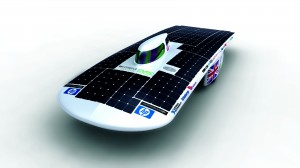THURSDAY, 1 OCTOBER 2009
Unveiled by Jenson Button at the Goodwood Festival of Speed in July, Endeavour is one of the projects marking the 800th anniversary of the University of Cambridge. The car’s power comes entirely from solar energy captured by a six metre squared covering of high-efficiency silicon cells. Underneath this skin is an ultra-efficient electric vehicle weighing just 170 kilograms. Able to cruise at 60 miles per hour using the same power as a hair dryer, up to fifty times less than a normal petrol-fuelled vehicle, designers say it could provide a model for other forms of green transportation.Computer simulations allowed the car’s aerodynamics, rolling resistance, weight and electrical efficiency to be optimised for minimum energy requirements. The car is fitted with a control system that provides battery management and an electric braking system which regenerates energy. In addition, the four student drivers who will pilot the car during the race only need to steer, as an advanced cruise control system automatically adjusts speed according to road conditions and weather forecasts.
Armed with these innovations, Endeavour is being touted as Britain’s brightest hope in October’s exhibition of ecologically friendly vehicles. Lindsey Nield
Oh you fat rat!
Eating a high fat diet may do more than just make you pile on pounds. Scientists led by Dr Andrew Murray have found that, compared to rats on a low fat diet, those fed on high fat food ran 35% less distance on a treadmill, had less efficient hearts and poor memory. What’s more, they observed this difference after just nine days. In the high fat diet regime, 55% of the daily calorie intake was similar to the Atkins diet, which is high in fat and low in carbohydrates, whilst the low fat diet would be similar to us eating nothing but muesli.
The team believe that some of the differences in performance may be due to increased levels of an uncoupling protein in heart and muscle cells which makes conversion of food to energy less efficient. Some athletes choose a high fat diet, thinking it gives them more energy; however this study shows that, even in the short term, a low fat diet is more beneficial for high performance. There are also implications for diabetics, where high levels of fat accumulate in the blood, and for people on diets similar to Atkins. Rachel Swain
Chlamydia tests in a jiffy
Chlamydia is currently detected by sending samples off to a lab and waiting days for the result. A new method, developed by the Diagnostic Developments Unit at the University of Cambridge, gives accurate results in just an hour, with no special equipment.
Chlamydia is a sexually transmitted bacterial infection, which often lingers symptomless, in both men and women, causing them to spread the disease unawares. In extreme cases it can also cause infertility. Rapid screening methods for women have already been developed, but as lead researcher Dr Helen Lee put it, “that only tackles half the problem.”
A key part of the test is ‘FirstBurst’, a device which collects only the first 5 ml of urine. This sample carries large numbers of Chlamydia, making them easier to detect. Even so, the technique only identifies about 80% of infections, so more sensitive laboratory tests will still be useful.
While the ‘silent epidemic’ of Chlamydia remains a large problem in developed countries, in developing countries where people live many days from a hospital, a quick result is essential. Thomas Kluyver



